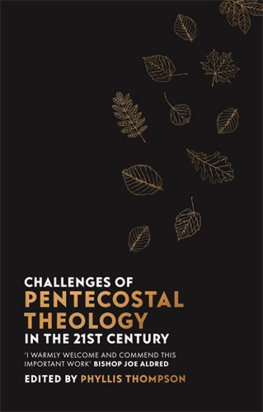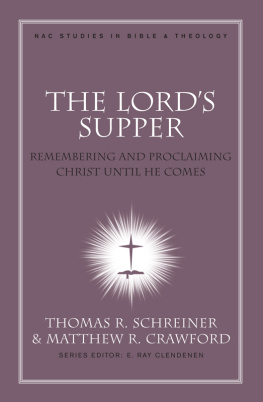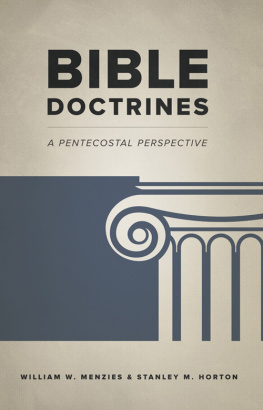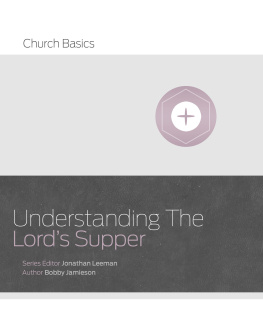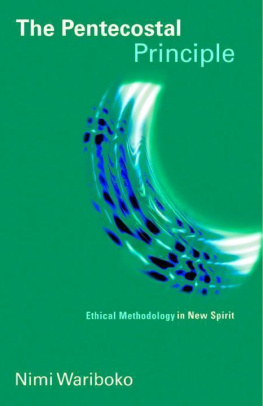T oward a Pentecostal Theology
of the Lords Supper
Foretasting the Kingdom
Toward a
Pen tecostal Theo l ogy
of the Lords Supper
Foretasting the Kingdom
Chris E. W. Green
CPT Press
Cleveland, Tennessee
Dedication
To Nan and Paz, for all your incredible generosity and support
Table of Contents
Introduction
Purpose and Focus of the Study
Structure and Flow of the Argument
The Sacraments in Pentecostal Perspective(s):
A Bibliograp h ic Review
Introduction
Reading Pentecostals on the Sacraments
Conclusions
(Re) Discovering the Sacramentality of Early Pentecostalism: An Exploration of the Early Periodical Literature
Prolegomena
Wesleyan-Holiness Period icals
Finished Work Periodicals
The Bod dys and British Pentecostalism:
Confidence Magazine
Early Pentecostal Sacramentality:
Summary and Concl u sions
The Lords Supper in the Churchs Scripture
Introduction
(Re)Imagining a Pentecostal Hermeneutic
Eating the Word: Eucharistic Theology in the
Conclusions: Toward a New Testament Theology of
the Euch a rist
Toward a Pentecostal Theology of the Lords Supper:
Di s cernment and Construction
Introduction
Prescription: What is Required of Us?
Promise: What Does God Do for Us?
Presence: How Does God Do What God Does?
Praxis: What Does This Mean for Pentecostal Thought
Contributions and Suggestions for Further Research
Contributions
Implications and Suggestions for Further Study
Preface
It seems most fitting to begin a book dedicated to the Eucharist by giving thanks to those who have made it possible. So, first, I want to thank my Doktorvater , John Christopher Thomas, who has pr o vided skillful and wise direction at every stage in the process of d e veloping and completing this work. To my grandparents, Nan and Paz; my mom and dad, Robert and LaCrisa Green; my parents-in-law, Chuck and Irene Niemyer; and everyone at Divine Life Church, I want to say that I am beyond grateful for your treme n dous generosity and constant support. A special thanks is due to a host of other friends as well, including my fellow PhD students and a number of colleagues at Oral Roberts University, Southwestern Christian University, and as of this summer Pentecostal The o logical Seminary. I need to mention, in particular, Jeff Lamp and Don Vance. How many times I held them captive in heavy conve r sation for hours on end and they never failed to provide valuable affirmation and critique. Obviously, my greatest debt is to my wife, Julie, and to my kids, Zo and Clive. Over the past few years, they have reordered their lives to make room for me to devote myself to this work, and somehow they did it joyfully, always believing in me and cheering me on along the way.
The idea for this book began to germinate years ago during u n dergraduate conversations with my good f riend, Dr Doug Beacham, and gre w to form over time in worship at Divine Life Church, where we celebrated weekly Communion and devoted many times together to teaching and to prayerful study and refle c tion on the meaning of the Eucharist-event for us as a community. Without that experience, and the many mysterious effects it worked on my heart and mind, I simply would not have had the power to imagine the shape of this work and the energy necessary to co m plete it.
My work, whatever its faults, is rooted and grounded in the Pe n tecostal tradition; and though some of the roots no doubt run u n der the wall, it is intended first and foremost as a conversation starter for the Pentecostal communities. Nothing would please me more than for the book, in spite of its weaknesses and limit a tions, in some way to contribute to a renewal of Pentecostal sacr a mental thought and practice. Of course, I also hope the branches reach over the wall so that Christians of other traditions find good fruit as well.
I am honored to publish this work with CPT Press, to have it listed in the company of landmark works like John Christopher Thomas The Devil, Disease and Deliverance , Steven Lands Pentecostal Spirituality , Roger Stronstads The Prophethood of All Believers , Larry McQueens Joel and the Spirit , and Ken Archers A Pentecostal Herm e neutic . I hope my own work is received as companion to works like these.
Abbreviations
Early Pentecostal Periodicals
AF The Apostolic Faith
CE The Christian Evangel
COGE The Church of God Evangel
LRE The Latter Rain Evangel
PE The Pentecostal Evangel
PHA The Pentecostal Holiness Advocate
PT Pentecostal Testimony
TBM The Bridegrooms Messenger
TP The Pentecost
WE Weekly Evangel
WW Word and Witness
Other
AJPS Asian Journal of Pentecostal Studies
ANF A Select Library of Ante-Nicene Fathers
ATR Anglican Theology Review
BEM Baptism, Eucharist and Ministry , Faith and Order P a per No. 111 (Geneva: World Council of Churches, 1982).
BNTC Blacks New Testament Commentary Series
BTC Brazos Theological Commentary Series
CPT Centre for Pentecostal Theology
DPCM Burgess, S.M. et al . (eds.), Dictionary of Pentecostal and Charismatic Movements (Grand Rapids: Zondervan, 1988).
IJST International Journal of Systematic Theology
IVP InterVarsity Press
JBL Journal of Biblical Literature
JEPTA Journal of European Pentecostal Theology Association
JETS Journal of the Evangelical Theological Society
JPT Journal of Pentecostal Theology
JPTSup Journal of Pentecostal Theology Supplement Series
JSNTS Journal for the Study of New Testament Supplement S e ries
NIDPCM Burgess, S.M. and E.M. van der Maas (eds.), The New International Dictionary of Pentecostal and Charismatic Movements (Grand Rapids: Zondervan, 2003).
NPNF A Select Library of Nicene and Post-Nicene Fathers
NTT New Testament Theology Commentary Series
OUP Oxford University Press
Pneuma Pneuma: The Journal of the Society for Pentecostal Studies
SBL Society of Biblical Literature
SNTSMS Studiorum Novi Testamenti Societas Monograph
S e ries
SVS St Vladimirs Seminary Press
SVTQ St Vladimirs Theological Quarterly
TPNTC Pillar New Testament Commentary Series
WJKP Westminster John Knox Press
Introduction
Purpose and Focus of the Study
The purpose of this study is to develop a distinctly Pentecostal th e ology of the Lords Supper that contributes to the larger project of revisioning Pentecostal theology . Several presuppos i tions undergird the stru c ture and flow of the argument.
First, as a living tradition, Pentecostalism can and should be r e visioned constantly without betraying itself or losing its chara c ter.
Second, in the effort to revision itself faithfully, Pentecostal th e ology should be informed by a critical conversation with the ea r liest years of the movement; for, as Walter Hollenweger first a r gued, the spirituality of early Pentecostalism represents the heart and not the infancy of the movement.
Third, it is necessary for a self-consciously Pentecostal th e ology to be as concerned with method as it is with content. For, as Terry Cross and others have contended, Pentecostal experience makes possible and so calls for the articulation of a unique the o logical methodology.
Fourth, owing to the role of Scripture in the tradition, Penteco s tal theology should be deeply biblical , rooted in and directed by the reading of the canonical scriptures. However, this affirmation alone is not enough. A Pentecostal approach to Scripture requires a he r meneutical strategy that remains at all points in keeping with the core convictions of the movements spiritual and theological trad i tion. Such a hermeneutic would include inter alia narrative sensiti v i ty, a concern for canonical context, and even go so far as to take seriously the texts effective history, including but not limited to the witness of early Pentecostal interpretations.
Next page



